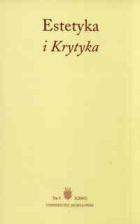“Epistemological Reading”: Stanley Cavell’s Method of Reading Literature
“Epistemological Reading”: Stanley Cavell’s Method of Reading Literature
Author(s): Magdalena FilipczukSubject(s): Philosophy, Aesthetics, Analytic Philosophy, Theory of Literature
Published by: Wydawnictwo Uniwersytetu Jagiellońskiego
Keywords: Stanley Cavell;method of reading literature;literature;skepticism;literary criticism;analytic philosophy;
Summary/Abstract: Not many readers will recognize ‘Disowning Knowledge: Seven Plays of Shakespeare’ by Stanley Cavell as either a piece of philosophical writing or literary criticism, so it may be useful to ask what method Cavell uses to read literature, what are the main features of his approach, and whether he has a coherent view on what reading literature means. I examine Cavell’s interdisciplinary eclecticism, the feature which makes his work so original, and I describe his moving away from the British and American analytic tradition in which he was trained to other sources of inspiration, especially Thoreau. I also stress the important fact that Cavell does not avoid autobiographical motifs in his writings, the style of which derives to some extent from the Jewish tradition of storytelling. In his writings Cavell declares his adherence to an ahistorical approach, maintaining that in a sense philosophy is trans historical. In many of his books the central issue is the challenge that skepticism poses, and he endeavors to make a convincing case against it. Although Cavell’s work covers a broad range of interests, including tragedy and literature, as well as Romantic poetry, Shakespeare, Henry James and Samuel Beckett, I try to answer the question of why his analyses of skepticism in literature focus especially on the works of Shakespeare.
Journal: Estetyka i Krytyka
- Issue Year: 43/2016
- Issue No: 4
- Page Range: 65-84
- Page Count: 20
- Language: English

